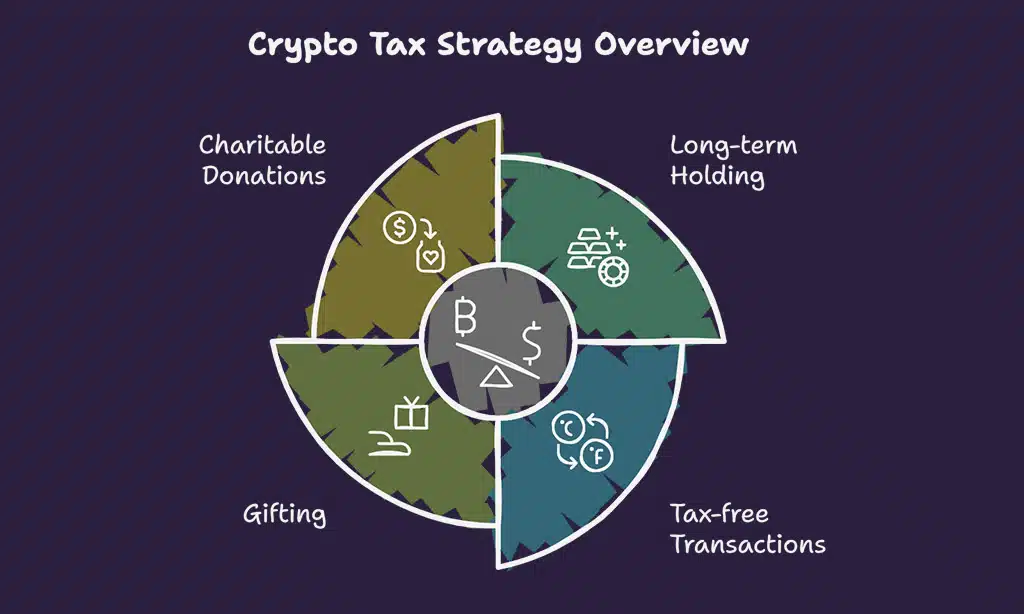Paying taxes on crypto can feel like solving a tricky puzzle. You buy, sell, trade, or earn crypto—and suddenly, there’s paperwork and tax rules to follow. Many investors don’t even realize what counts as taxable or how the IRS tracks digital assets.
Did you know holding your crypto for over a year could save you big? Long-term gains come with lower tax rates—sometimes even 0%! But without the right strategies, you might pay more than necessary.
In this post, we’ll show you smart ways to handle crypto taxes in 2025. From cutting tax bills to avoiding costly mistakes, these tips will keep your wallet happy (and legal). Ready to learn more? Keep reading!
Understanding Crypto Taxes in 2025
Crypto taxes in 2025 might feel like a puzzle, but knowing the rules can save you cash. Did you know even swapping one crypto for another could trigger taxes?
Key taxable events for crypto investors
Crypto investors must understand taxable events in 2025. Each transaction can result in taxes, even small ones. These are the main events to monitor:
- Selling digital assets for cash is considered a taxable event. The IRS taxes this based on your capital gain or loss.
- Trading one cryptocurrency for another is treated as a taxable event. The IRS views this as a sale, and you must report gains or losses.
- Spending cryptocurrencies on goods or services is taxable. You owe taxes if the crypto’s market value increased since you acquired it.
- Receiving crypto as payment for work is considered income for tax purposes. Report its fair market value when received.
- Staking rewards are classified as income and taxed at their fair market value.
- Mining income is taxable based on its market value when received.
- Airdrops from new projects are counted as income upon receipt, regardless of whether you sell them later.
- Hard forks that generate new coins must be reported when you gain control of those assets.
- Gifting cryptocurrency exceeding the gift tax threshold might require paying a gift tax, depending on the amount and relation to the recipient.
- Crypto collateral loans generally do not trigger taxes unless parts default or are liquidated into cash or sold assets.
- Transferring crypto between personal wallets isn’t taxable unless other events occur during transfer steps, such as fees creating realized changes exceeding cost basis records or final balances adjusted without additional clarity enforcement rules affecting profits adjustments, as clarified to avoid misunderstandings and penalties under the rules.
Overview of IRS reporting requirements
The IRS requires taxpayers to report all crypto transactions. Buying, selling, exchanging digital assets, or earning staking rewards must go on your tax return. Use Form 1040 to disclose gains or losses from crypto trading.
Income earned through mining and airdrops also needs reporting.
Form 1099-DA is now key for compliance in 2025. Cryptocurrency exchanges will issue this form for specific transactions. Failing to include these forms could lead to fines or audits.
Keep detailed records of every trade, cost basis, and fair market value for accuracy.
Holding Strategies to Minimize Taxes
Holding your crypto for over a year can lower tax rates. Some transactions may also qualify as non-taxable, giving you more breathing room.
Long-term holding for reduced capital gains rates
Crypto held for over a year gets taxed at lower capital gains rates. These rates are 0%, 15%, or 20%, depending on your income. This is much better than short-term rates, which match higher income tax brackets.
For example, selling Bitcoin after one year could save thousands in taxes compared to selling it earlier. Planning when to sell can help reduce your tax bill while growing your crypto investments smartly.
Tax-free crypto transactions
Some crypto transactions may not trigger taxes. For example, buying digital assets and holding them creates no tax liability until sold or traded. Moving cryptocurrency between your wallets is also tax-free since there’s no gain or loss involved.
Gifting crypto under the annual gift limit ($17,000 per recipient in 2023) avoids income taxes and capital gains taxes. Donations to qualified charities offer a double benefit: you won’t pay capital gains on appreciated assets, and you might get a tax deduction equal to its fair market value if itemized.
Tax-Loss Harvesting
Feeling the sting of a bad trade? Turn those losses into tax savings by offsetting gains with them instead.
Offset gains with crypto losses
Use crypto losses to cut your tax bill. If you sell a digital asset for less than you paid, that’s a capital loss. These losses can offset gains from profitable trades. For instance, if you made $10,000 in profits but lost $4,000 on another coin, only $6,000 gets taxed.
Unused losses carry forward to future years. The IRS allows up to $3,000 annually to reduce regular income like wages. Be cautious of the wash sale rule—it prevents deducting losses if you repurchase the same asset within 30 days.
Smart moves here can save big money!
Rules for avoiding wash sales
Wash sales occur if you sell crypto at a loss and buy the same or similar asset within 30 days. To avoid this, wait at least 31 days before repurchasing the same cryptocurrency. This rule prevents doubling up on tax benefits for the same loss.
Plan your trades carefully to follow IRS guidelines. If you must reinvest quickly, consider buying a different crypto asset instead of the one sold. Using crypto tax software can help track these timelines and reduce errors in reporting.
Leveraging Crypto IRAs and Retirement Accounts
Want to grow your crypto without getting buried in taxes? Using self-directed IRAs could give you the tax break you’re chasing.
Tax advantages of crypto in IRAs
Crypto IRAs let your investments grow tax-free or tax-deferred. A self-directed IRA allows holding crypto assets like Bitcoin, Ethereum, or other digital currencies. If you pick a Roth IRA, withdrawals in retirement can be completely tax-free.
Traditional IRAs offer upfront tax breaks since contributions reduce taxable income now.
Long-term holdings in these accounts avoid short-term income taxes on earnings like staking rewards or capital gains from sales. For example, selling $50,000 worth of Bitcoin within an IRA won’t trigger immediate taxes.
This setup keeps more money working for future growth and minimizes yearly reporting hassles with the IRS.
Donating Cryptocurrency
Giving crypto to charity isn’t just kind—it could lower your tax bill, too.
Tax deductions for crypto donations
Donating cryptocurrency to a qualified nonprofit can reduce your tax bill. The IRS allows you to deduct the fair market value of crypto donations on the date given, if held for over a year.
This avoids capital gains taxes on appreciated assets, which is better than selling first and donating cash.
Only donate to registered charities under Section 501(c)(3) for full benefits. For donations over $5,000, get an appraisal and submit Form 8283 with your tax return. Keep records of the transaction for IRS requirements—wallet addresses, timestamps, and donation confirmations are key.
Staking, Mining, and Airdrop Tax Tips
Earning through staking, mining, or airdrops can feel like free money, but the taxman doesn’t see it that way. These rewards count as income and must be reported based on their value when received.
How staking rewards and mining income are taxed
Staking rewards count as income. The IRS taxes them based on their fair market value when received. You must report this amount as ordinary income on your tax return, using the correct forms like Schedule C if you’re a miner running it as a business.
Crypto mining income is also taxable. It’s treated just like earned wages or self-employment income. If you mine crypto through large-scale operations, expenses such as electricity and equipment can be deducted to lower your tax bill.
Even hobby miners need to report earnings, though hobby-related deductions aren’t allowed anymore.
Reporting airdrops and forks correctly
Report airdrops as ordinary income. Use the fair market value of the tokens on the day you receive them. Include this amount in your total cryptocurrency income for that year.
For hard forks, report any newly received coins as taxable income if you gain control. The value at receipt becomes your cost basis. Soft forks don’t create new coins, so they are not taxed directly.
Keep detailed records to avoid IRS errors on tax forms like Form 1099-DA or Schedule C.
Using Crypto Tax Software
Crypto tax software can save time by calculating gains, losses, and income automatically. Why stress over spreadsheets when tools can handle the heavy lifting?
Automating tracking and reporting
Using crypto tax software simplifies tracking and reporting. Tools like these can sync with wallets, exchanges, and DeFi platforms. They automatically calculate fair market value and cost basis for your trades.
This eliminates manual errors, saving you time and preventing IRS mistakes.
Some programs also generate forms like 1099-DA or Schedule C instantly. For example, they flag taxable events such as staking rewards or mining income. Automated tools keep records organized all year round, making tax compliance easier for investors in 2025.
Understanding Global Crypto Tax Havens
Some countries offer friendlier crypto tax rules. Want to keep more of your gains? Look into their policies carefully but tread wisely—each has its own quirks!
Countries with favorable crypto tax policies
Some countries are making crypto taxes easier for investors. They offer low or no tax rates on digital assets.
- Portugal: This country does not tax long-term capital gains from crypto. Personal crypto gains remain untaxed if not tied to professional trading.
- Germany: Gains on cryptocurrency held for over a year are entirely tax-free. Shorter holdings are taxed based on income levels.
- Malta: Known as the “Blockchain Island,” Malta does not charge taxes on long-term crypto investments. Day-to-day trading is considered business income, though.
- Singapore: Crypto transactions here are tax-free for individuals. Businesses involved in crypto pay standard corporate taxes.
- Switzerland: This nation has a balanced approach to taxes on digital assets. Long-term holders face no taxation, while miners and professionals pay normal income tax.
- El Salvador: As Bitcoin’s first official user, El Salvador offers zero capital gains tax on Bitcoin profits for foreign investors.
- Belarus: The government declared all crypto-related activities free of taxes until at least 2025 to boost blockchain growth.
- United Arab Emirates (UAE): No capital gains or personal income tax exists here, making it attractive for crypto holders and businesses alike.
- Cayman Islands: Investors enjoy zero personal or corporate tax on digital assets in this Caribbean territory.
- Bermuda: Like the Cayman Islands, Bermuda imposes no income or capital gains taxes on cryptocurrency transactions and trades.
- Puerto Rico: U.S citizens who relocate here can benefit from reduced federal obligations under Act 60, including lower income and capital gain rates for cryptos.
- Estonia: Though business operations involving cryptocurrencies are taxed, private users holding cryptos pay no annual wealth taxes at all!
How to Stay Compliant with IRS Form 1099-DA
Staying on top of IRS Form 1099-DA rules isn’t optional—miss a detail, and you could face fines or audits; explore this guide to learn the quick tips that keep headaches away.
New crypto reporting standards in 2025
New IRS rules in 2025 bring stricter reporting for cryptocurrency transactions. Form 1099-DA is now required for exchanges, wallets, and brokers to report user activity. This includes buy/sell trades, staking rewards, mining income, airdrops, and even crypto-to-crypto swaps.
The form helps calculate your fair market value and cost basis accurately. It closes loopholes that some investors used to evade taxes in the past.
Failing to file correct reports could mean heavy penalties or audits from the IRS. Blockchain analysis tools will track activities like never before. Accurate record-keeping is key to avoiding tax fraud claims or errors on returns.
Using reliable crypto tax software can simplify this process while staying compliant with new tax reforms.
Best Practices for Record Keeping
Keep detailed records of every crypto trade, transfer, and transaction. Good record keeping can save time, cut stress, and help avoid tax issues later.
Tracking transactions and cost basis
Track every crypto trade and transfer. Record dates, amounts, and values in dollar terms. Use the fair market value at the time of each transaction. This helps calculate gains or losses later.
Cost basis matters a lot for taxes. It’s what you paid when you got the crypto, plus fees. For example, if you bought Bitcoin for $10,000 and sold it for $15,000, your taxable gain is $5,000.
Crypto tax software makes this easier by automating records and reports.
Takeaways
Crypto taxes in 2025 don’t have to feel overwhelming. You now know key strategies like holding long-term, using tax-loss harvesting, and leveraging IRAs. These tips can lower your tax bill and keep you compliant with the IRS rules.
Start tracking all crypto transactions early for smooth reporting later. Use tools like crypto tax software to save time and avoid mistakes. Ask yourself: Are you ready to maximize savings this year? Small changes today can lead to big benefits tomorrow.
Make smart moves, stay informed, and keep more of what you earn from investing!
FAQs
1. What are capital gains taxes, and how do they apply to crypto?
Capital gains taxes apply when you sell or trade cryptocurrency for more than what you paid (your cost basis). Short-term capital gains are taxed at higher rates than long-term ones.
2. How does tax-loss harvesting work with cryptocurrencies?
Tax-loss harvesting lets you offset your capital gains by selling digital assets at a loss. This strategy can reduce the amount of tax owed on profits.
3. Do staking rewards and mining rewards count as taxable income?
Yes, both staking rewards and mining rewards are considered cryptocurrency income by the IRS. You must report their fair market value as income on your tax returns.
4. Can I avoid paying taxes on crypto-to-crypto transactions?
No, crypto-to-crypto transactions are taxable events in most countries, including the U.S., because they involve exchanging one asset for another with potential capital gains or losses.
5. Are decentralized finance (DeFi) activities subject to taxation?
Yes, DeFi activities like earning from lending platforms or liquidity pools such as Uniswap may generate taxable events under current tax laws.
6. Should I use crypto tax software for reporting my cryptocurrency taxes?
Using crypto tax software can simplify tracking cost basis, calculating fair market value, and preparing accurate forms like Form 1099-DA or Schedule C for compliance with IRS enforcement policies.






































